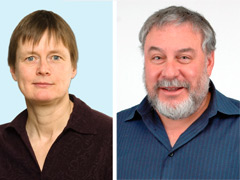Scientists Garner National Grants in Inaugural Competition
By Eleni Kanavas
Sunnybrook Research Institute (SRI) senior scientists Dr. Anne Martel and Dr. Martin Yaffe have been awarded grants from the Canadian Breast Cancer Foundation in its first competition targeting research in earlier detection of breast cancer.
A total of $849,380 was awarded to SRI.
Martel will receive $403,497 over three years to continue research focused on improving the early detection of breast cancer in high-risk women using magnetic resonance imaging (MRI) screening.
"It means we can continue to build on our previous work and bring the technology much closer to the point where it can be used clinically to aid radiologists." Martel says. "We've already developed a unique database of MRI breast screening images and now we will use this to "train" a computer system to find abnormalities and decide whether these are cancer."
The aim of the study is to use information from previous patient visits and the large MRI database to examine the changes that occur between one screen test and the next. The team will develop computer-aided diagnostic tools to help radiologists reduce the number of false positives (the rate of detecting suspicious abnormalities that turn out not to be cancer). The goal is to improve the accuracy of MRI screening, which will lead to fewer false alarms and fewer occurrences of women who don't have breast cancer getting called back.
Yaffe will receive $445,883 over three years to conduct an international trial evaluating 3-D digital tomosynthesis for breast cancer screening. Digital tomosynthesis is built on the platform of a digital mammography system (an X-ray exam of the breast) that uses a digital camera to capture and reconstruct a 2-D image. Yaffe and his team will compare the accuracy of 3-D digital tomosynthesis versus 2-D digital mammography to determine how effective it is in reducing the number of missed tumours and to help find breast cancers earlier.
"It's extremely exciting, because I really do feel that tomosynthesis may well provide us with the next valuable tool for screening women for breast cancer and reducing mortality rates," Yaffe says. "I think technically it has a lot of promise and will provide better accuracy than digital mammography, but really the study we were funded to carry out is going to allow us to answer this important question."
The trial will begin in early 2013 and take place at at least 16 sites in Canada and the United States. More than 30,000 women will participate. As one of the senior leaders of the study, Yaffe will help in the overall design of the trial and to develop and implement a quality control program that will be applied at all of the sites.
Two panels of international and Canadian experts reviewed 41 proposals submitted by research teams across Canada and eight projects were selected. The agency is funding more than $3.2 million in innovative projects from across Canada focused on advancing new technologies to find cancer at its earliest stages. Partner organizations provided additional funding.






